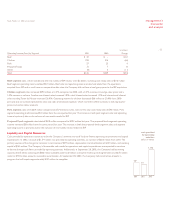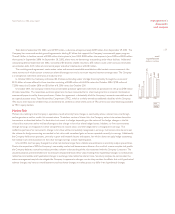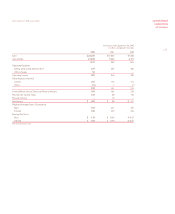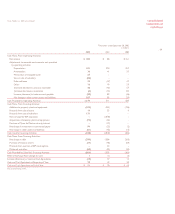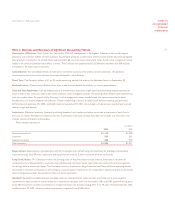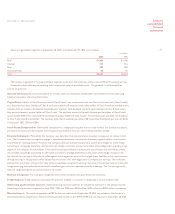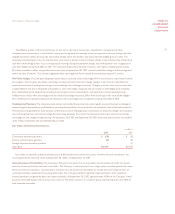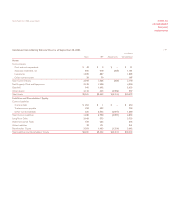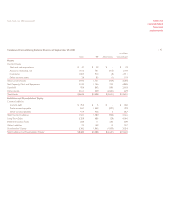Tyson Foods 2002 Annual Report Download - page 34
Download and view the complete annual report
Please find page 34 of the 2002 Tyson Foods annual report below. You can navigate through the pages in the report by either clicking on the pages listed below, or by using the keyword search tool below to find specific information within the annual report.
notes to
consolidated
financial
statements
p 32
Amount of goodwill by segment at September 28, 2002, and September 29, 2001 was as follows:
in millions
2002 2001
Beef $1,306 $1,306
Chicken 917 916
Pork 350 350
Prepared Foods 60 46
Total $2,633 $2,618
The increase in goodwill in the prepared foods segment results from the acquisition of the assets of Millard Processing Services.
Goodwill has been allocated to reporting units based on fair value of identifiable assets. This goodwill is not deductible for
income tax purposes.
Accrued Self Insurance: Insurance expense for casualty claims and employee-related health care benefits are estimated using
historical experience and actuarial estimates.
Capital Stock: Holders of Class B common stock (Class B stock) may convert such stock into Class A common stock (Class A stock)
on a share-for-share basis. Holders of Class B stock are entitled to 10 votes per share while holders of Class A stock are entitled to one
vote per share on matters submitted to shareholders for approval. Cash dividends cannot be paid to holders of Class B stock unless
they are simultaneously paid to holders of Class A stock. The per share amount of the cash dividend paid to holders of Class B stock
cannot exceed 90% of the cash dividend simultaneously paid to holders of Class A stock. The Company pays quarterly cash dividends
to Class A and Class B shareholders. The Company paid Class A dividends per share of $0.16 and Class B dividends per share of $0.144
in fiscal years 2002, 2001 and 2000.
Stock-Based Compensation: Stock-based compensation is recognized using the intrinsic value method. For disclosure purposes,
pro forma net income and earnings per share impacts are provided as if the fair value method had been applied.
Financial Instruments: Periodically, the Company uses derivative financial instruments to reduce its exposure to various market
risks. The Company does not regularly engage in speculative transactions, nor does the Company regularly hold or issue financial
instruments for trading purposes. However, the Company does periodically hold positions as economic hedges for which hedge
accounting is not applied. Generally, contract terms of a hedge instrument closely mirror those of the hedged item providing a high
degree of risk reduction and correlation. Contracts that are highly effective at meeting the risk reduction and correlation criteria
are recorded using hedge accounting. If a derivative instrument is a hedge, depending on the nature of the hedge, changes in the
fair value of the instrument will either be offset against the change in fair value of the hedged assets, liabilities or firm commitments
through earnings or recognized in other comprehensive income until the hedged item is recognized in earnings. The ineffective
portion of an instrument’s change in fair value will be immediately recognized in earnings. Instruments that do not meet the criteria for
hedge accounting are marked to fair value with unrealized gains or losses reported currently in earnings. The Company generally
does not hedge anticipated transactions beyond 12 months.
Revenue Recognition: The Company recognizes revenue from product sales upon delivery to customers.
Freight Expense: Freight expense associated with products shipped to customers is recognized in cost of products sold.
Advertising and Promotion Expenses: Advertising and promotion expenses are charged to operations in the period incurred.
Advertising and promotion expenses for fiscal 2002, 2001 and 2000 were $396 million, $337 million and $280 million, respectively.
Minority Interest: The results of operations of IBP for the nine weeks ended September 29, 2001, are included in the Company’s
consolidated results of operations. Minority interest primarily consists of the 49.9% of IBP that was acquired on September 28, 2001.
Tyson Foods, Inc. 2002 annual report


